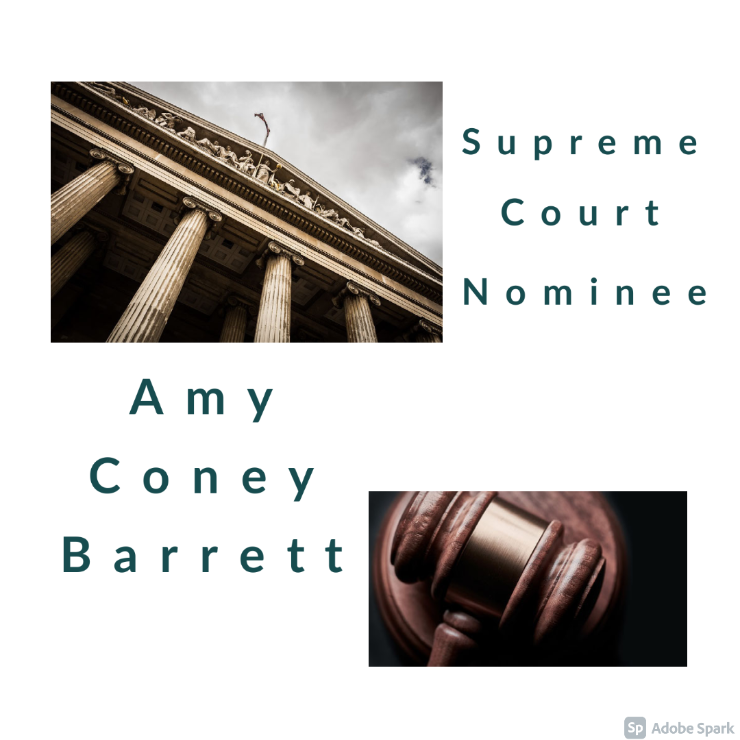On Sept. 26, President Donald J. Trump announced his nominee, Amy Coney Barrett, for the vacant seat on the Supreme Court. This occurred eight days after the passing of Justice Ruth Bader Ginsburg, whom Barrett will succeed if approved.
“Today, it is my honor to nominate one of our nation’s most brilliant and gifted legal minds to the Supreme Court,” said Trump. “She is a woman of unparalleled achievement, towering intellect, sterling credentials, and unyielding loyalty to the Constitution: Judge Amy Coney Barrett. “
Amy Coney Barrett was born in Louisianna in 1972. She received a Catholic education in her years of growing up, attending St. Catherine of Siena elementary school and St. Mary’s Dominican High School. Barret went to Rhodes College in Tennessee and also graduated first in her class at Notre Dame Law school, where she taught for 15 years as a professor. She worked as a clerk and a lawyer before teaching. Barrett is serving as a judge on the seventh U.S. Circuit Court of Appeals after being confirmed in 2017.
“Being a judge takes courage. You are not there to decide cases as you may prefer. You are there to do your duty and to follow the law wherever it may take you,” said Barrett.
Based on Barrett’s previous cases and writings, her decisions are based on what is strictly written in the Constitution which is also known as originalism. In the 2019 case of Kanter v. Barr, a case of the Seventh Circuit of the U.S. Court of Appeals on which Barrett served as judge, the defendant, Rickey Kanter, argued that convicted felons should not be prohibited from using firearms and that the regulation against it was unconstitutional. Barrett wrote that the original writers of the Constitution did not strip felons of their right to bear arms.
On her opinions on stare decisis where courts would follow precedents, decisions made from previous cases, Barrett wrote in a 2013 article about not agreeing to follow the doctrine.
“I tend to agree with those who say that a justice’s duty is to the Constitution and that it is thus more legitimate for her to enforce her best understanding of the Constitution rather than a precedent she thinks clearly in conflict with it,” Barrett wrote.
On her views of abortion, Barrett is notably pro-life and in her 2017 confirmation gave a statement on the Roe v. Wade US Supreme Court case that legalized abortion.
“Roe has been affirmed many times and survived many challenges in the court, and it’s more than 40 years old, and it’s clearly binding on all Court of Appeals— so it is not open to me or up to me, and I would have no interest in, as a Court of Appeals judge, challenging that precedent — it would bind,” said Barrett.
In the past Barrett signed a 2006 newspaper advertisement that supported anti-abortion.
“We, the following citizens of Michiana, oppose abortion on demand and defend the right to life from fertilization to natural death,” said the statement.
In the piece “Catholic Judges in Capitol cases,” Barrett wrote about the death penalty and voiced her opinion on how Catholic judges should remove themselves from a case if it conflicts with their religious beliefs.
If Barrett is confirmed by the Senate she will be the fifth woman to serve on the Supreme Court and youngest justice on the current court. She will also make the court a six-to-three conservative majority. The Senate hearings will most likely happen on Oct. 12, although they typically take place months after a nomination.The hearings would also last three to four days to officially confirm Barrett. Barrett’s nomination has received criticism as conservatives are pushing the hearings to happen by the end of the month but refused to confirm former President Barack Obama’s 2016 Supreme Court nominee, Judge Merrick Garland. Senator Mitch McConnell in 2016 rejected Obama’s nomination and said that a new judge should be chosen by the next president.
“One of my proudest moments was when I looked Barack Obama in the eye and I said, ‘Mr. President, you will not fill the Supreme Court vacancy,'” said McConnell in an August 2016 speech.
Garland did not have any hearings and was never confirmed. On Monday, Oct. 5, McConnell wrote in a tweet that the hearings would start a week from that day on Monday, Oct. 12.
-July Two



